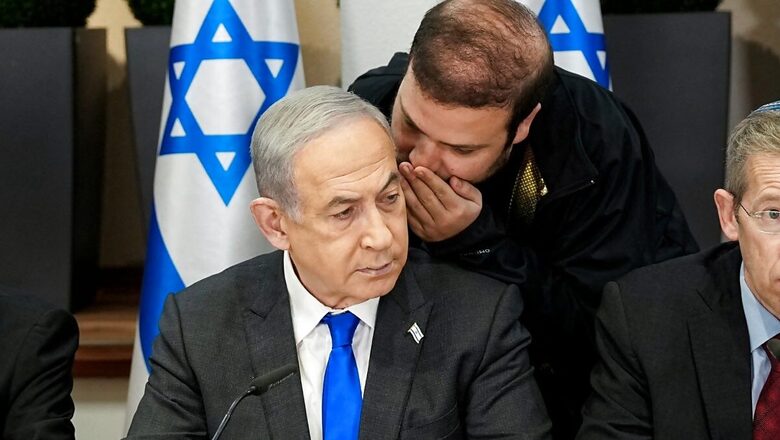
views
Israeli strikes in central Gaza killed at least 35 people Sunday, hospital officials said, as the military targeted areas in several parts of the territory a day after the country’s prime minister said the war will continue for “many more months,” resisting international calls for a cease-fire.
The military said Israeli forces were operating in Gaza’s second-largest city, Khan Younis, and residents reported strikes in the central part of the tiny enclave, after Israel this week made that region the new focus of its war.
The war has raised fears of a broader regional conflagration. The U.S. military on Sunday said it shot down two anti-ship ballistic missiles fired toward a container ship by Yemen’s Houthi rebels in the Red Sea. Hours later, four boats tried to attack the same ship, but U.S. forces opened fire, killing several of the armed crews, the U.S. Central Command said.
Israel says it wants to destroy Hamas’ governing and military capabilities in Gaza, from where it launched its Oct. 7 attack on southern Israel that killed 1,200 people and took 240 people hostage, according to Israeli authorities.
Israel’s unprecedented air and ground offensive has killed more than 21,600 Palestinians and wounded more than 55,000 others, according to the Health Ministry in Hamas-ruled Gaza.
The war has sparked a humanitarian crisis, with a quarter of Gaza residents facing starvation, according to the United Nations. Israel’s bombardments have levelled vast swaths of the territory, making parts uninhabitable and displacing some 85% of Gaza’s inhabitants.
Israel expanded its offensive to central Gaza this week, targeting a belt of dense urban neighborhoods that house refugees from the war surrounding Israel’s creation in 1948 and their descendants.
The fighting has left Palestinians in Gaza with the feeling that nowhere is safe.
In the area of Zweida in central Gaza, an Israeli airstrike killed at least 13 people and wounded dozens of others, according to witnesses.
The bodies were draped in white plastic and laid out in front of a hospital, where prayers were held before burial.
“They were innocent people,” said Hussein Siam, whose relatives were among the dead. “Israeli warplanes bombarded the whole family.”
Officials from Al-Aqsa Hospital in central Deir al-Balah said the 13 were among 35 bodies received on Sunday.
The Israeli military said it was battling militants in Khan Younis, where Israel believes Hamas leaders are hiding. It also said its forces operating in Shati, in northern Gaza, found a bomb in a kindergarten and defused it. Hamas continued to launch rockets toward southern Israel.
Israel has faced stiff resistance from Hamas since it began its ground offensive in late October, and the military says 172 soldiers have been killed during that time.
The magnitude of the destruction in Gaza coupled with the war’s length has raised questions about the achievability of Israel’s goal to quash Hamas as well as about its plans for post-war Gaza.
Israeli Prime Minister Benjamin Netanyahu has said Israel must maintain open-ended security control over the Gaza Strip, without saying what would come next. At a news conference Saturday, where he said the war would continue for “many more months,” he reiterated his intention to preserve an Israeli military foothold in a narrow strip of land in southern Gaza near the border with Egypt.
“(It) must be in our hands, it must be sealed. It’s clear that any other agreement will not guarantee the demilitarization that we need and require,” Netanyahu said. Israel says Hamas has smuggled weapons in through the Egyptian border, but Egypt is likely to oppose any Israeli military presence there.
In his public remarks about Israel’s plans for the Gaza Strip, Netanyahu has also said he won’t allow the internationally-backed Palestinian Authority, which administers some parts of the West Bank, to participate in any future rule over Gaza.
That position has put Netanyahu at odds with the Biden administration over who should run Gaza after the war. The U.S. backs the idea that a unified Palestinian government should run both Gaza and parts of the Israeli-occupied West Bank as a precursor to eventual statehood.
Israeli media have reported that Netanyahu has repeatedly dodged holding meetings with his War Cabinet about the post-war possibilities.
Israelis, who still largely stand behind the war’s goals, are showing signs they are losing patience.
On Saturday night, thousands protested against Netanyahu, one of the largest demonstrations against the long-serving Israeli leader since the war began. The country, which is sharply divided over Netanyahu and a legal overhaul plan he has set in motion, has remained mostly united over the war.
“It is true that the state of Israel has many enemies and threats, but unfortunately today Prime Minister Netanyahu and his continued rule is the most significant existential threat to our country and our society,” said protester Gal Tzur.
A separate protest Saturday called for the release of the 129 remaining hostages held by Hamas. Families of hostages and their supporters have demanded that the government prioritize hostage releases over other war objectives, and have staged large protests every weekend.
Egypt, one of the mediators between Israel and Hamas, has proposed a multistage plan that would kick off with a swap of hostages for prisoners, accompanied by a temporary cease-fire — along the lines of an exchange during a weeklong truce in November.
But the sides still appear far from striking a new deal. The leader of the Palestinian Islamic Jihad militant group holding Israeli hostages said Sunday there will be no exchange with Israel before the war ends and Israel withdraws its troops from the Gaza Strip, echoing Hamas’ position



















Comments
0 comment